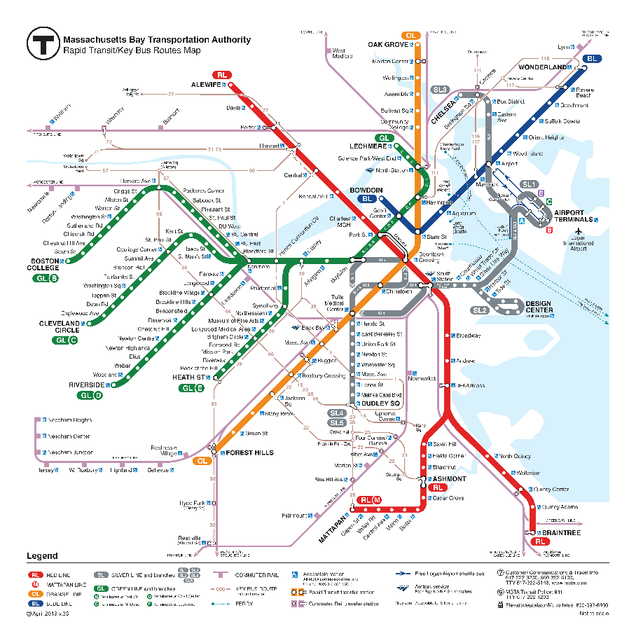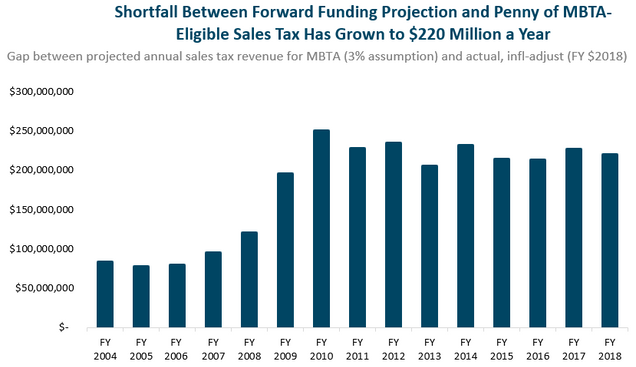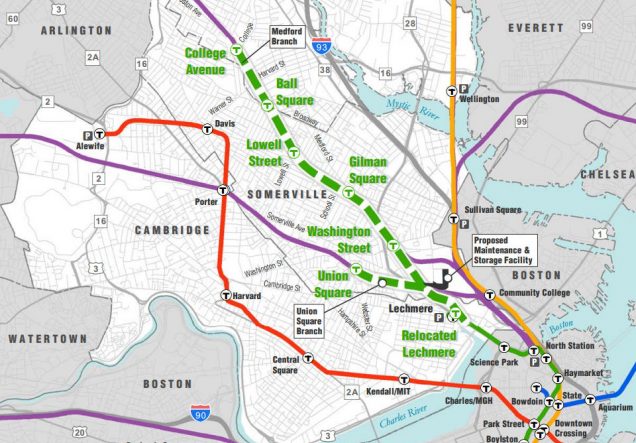Funding the MBTA: Getting Derailed Plans Back on Track
Taking the T
The transit system of Eastern Massachusetts, governed by the Massachusetts Bay Transportation Authority, has been the subject of much ire by residents of Greater Boston for decades, particularly where the subway, or “T,” is concerned. A prime example is last year’s decision to raise fares by 6% despite continual failures in service, such as a recent derailment on the Red Line and power shutdown on the Blue Line. As the oldest subway system in North America, many of the T’s problems stem from decades- or even century-old design decisions which are impractical to redo today. For example, its hub-and-spoke layout emphasizes access to downtown Boston at the expense of ease of travel between the edges of the system.
Broke, But Not Broken
However, the primary barrier to the T being the efficient, functional transit system that Boston needs it to be is insufficient funding relative to necessary maintenance and upgrades, not to mention its current debt load. Though the MBTA system as a whole sees more than $2 billion in annual revenue, it still endures annual operating losses of more than $36 million. Significantly, the majority of its revenue does not come from operations, i.e. fares collected, but rather from sales tax and local assessment contributions. For nearly twenty years, a “penny” of all non-meal-and-drink sales tax revenue in Massachusetts has been dedicated to the MBTA budget. Because this source of tax revenue has not grown as anticipated, the MBTA budget has consequentially fallen short of expectations by well over $200 million per year. Meanwhile, costs of new projects continue to balloon. The cost of an upgraded fare collection system, originally budgeted at just over $700 million, has now grown to over $900 million.
Boston City Councilor Michelle Wu argues that incremental fixes and patching of problems is insufficient; rather, we must invest in the system as a whole with a focus on expanding access. The necessity of serious capital investment became especially apparent after historic blizzards in early 2015 forced a system-wide shutdown. Wu has pointed to Governor Charlie Baker’s reluctance to act as an obstacle to the requisite overhaul the T needs. In response to pressure from her and other transit advocates, last summer Gov. Baker announced plans to accelerate an ongoing five-year, $8 billion capital investment program which kicked off in early 2019. The program aims to provide new rapid-transit buses and train cars, modernize the Red and Orange Lines, and fund a major expansion of the Green Line into underserved areas of Somerville and Medford. The latter, a long-suffering project decades in the making, is an example of the importance of major investment in transit: once complete, the percentage of Somerville residents within walking distance to light rail will increase to 80%, up from a current 20%. Gov. Baker’s acceleration includes more aggressive closures to allow for infrastructure work, more inspections and maintenance, negotiations with contractors, and the creation of a new team of MBTA personnel with the flexibility to work on multiple projects.
Capital Infusions
Even so, continued problems, such as the aforementioned Red Line derailment, prompted Gov. Baker to propose an $18 billion bond bill for transportation throughout the Commonwealth last year, providing money to the entire Massachusetts Department of Transportation, including a $5.7 billion slice for the MBTA. This bill, An Act Authorizing and Accelerating Transportation Investment, most recently received approval, with an amendment, from the House Committee on Bonding, Capital Expenditures and State Assets and moved before the House Committee on Ways and Means in late February, 2020. This Act would fund road and bridge repairs, MBTA upgrades, and the electrification of regional transit services, as well as contribute to big projects such as Cape Cod Canal bridges and the Green Line Extension. The bill also provides support for improving pavement on public roads and building small bridges as well as help for municipalities seeking to make their roads more cyclist- and pedestrian-friendly. Other provisions aim to reduce traffic congestion and greenhouse gas emissions by building bus lanes and working to reduce bottlenecks. Transportation Secretary Stephanie Pollack highlighted the importance of action on other projects which complement improved transit service to maximize the impact of the bill. Such legislation includes Gov. Baker’s proposed Housing Choices Act, which would streamline zoning approval for certain housing projects.
This past January, Gov. Baker also proposed a $135 million budget increase for the MBTA, possibly in response to a scathing December 2019 report by the Safety Review Panel which found deficiencies “in almost every area” of the MBTA system. A major criticism was the recent over-emphasis on capital improvements and not enough support for regular maintenance and safety, with staff being diverted away from the latter. However, it is unclear how exactly the infusion of funding would be spent.
It should be noted that there currently remain $743 million in outstanding senior revenue bond loans to MassDOT, though the Department maintains an A+ rating for borrowing. Though the Act Authorizing and Accelerating Transportation Investment would be funded by further borrowing via bonds, its original version allocated half of all revenue from a potential greenhouse gas cap-and-trade program with other states in the region to public transit, creating a stream of revenue as well as encouraging more fuel-efficient cars. However, that provision was stricken by the Transportation Committee, which argued that they cannot allocate funds to a program that does not yet exist. Lawmakers instead plan to increase fees on transportation network companies and deeds excise taxes.
COVID-19 Crisis
The amendments, including those made earlier by the House Committee on Transportation, include the elimination of $50 million in business tax cuts to encourage employees to work from home and thus reduce traffic congestion, a quaint decision in the midst of the COVID-19 pandemic which has forced millions to work from home anyway. The MBTA has been understandably hit hard, and as of April, ridership on the T was down more than 90% from late February, with bus service down nearly 80%. Anticipated losses this year exceed $213 million due to a 95% plunge in fare collection and drops in revenue from advertising and state sales tax. MassDOT hopes to cover the loss with an expected infusion of $840 million in federal funds through the CARES Act. Meanwhile, the MBTA has reduced service, instituted cleaning and sanitizing regimes for vehicles, and has begun requiring employees and remaining riders to wear face masks.
Needless to say, major investment decisions as of this writing have been put on hold. However, once this crisis has passed, it is critical that Massachusetts act to ensure its transit services remain a functional asset to the people of the Greater Boston Area and beyond.
 Kellen Safreed anticipates graduating from Boston University School of Law in May 2021.
Kellen Safreed anticipates graduating from Boston University School of Law in May 2021.


